1. Where and how was the Vincent de Paul Center Nederland born?
Vincent de Paul Center Netherland was born in Nijmegen, a medium-sized university town close to the border with Germany. It is one of the oldest cities in our country and known by many for its international walking event ‘Walk of the World’.
A house is to be sold
When the Study House Vincentius a Paulo in Nijmegen, a house of the Congregation of the Mission (cm), was to be sold in 2011, it was Tjeu van Knippenberg’s wish that ‘the voice of Vincent de Paul would continue to sound in the city’. If the name of this great social inspirator should continue to sound in our city, that could contribute to the social and spiritual quality of our local society. It is this wish that marks the beginning of Vincent de Paul Center Nederland.
A wish appears
The first activity of Tjeu and me was to give words to his initial wish. How could this still vague wish take shape and have content? This resulted in a one-page starting note, titled ’Vincent de Paul Center – a first impulse’. We asked several nearby people to react. Since the feedback was encouraging and positive, we formed an initiative group and together we wrote a business plan. Again, but now on a broader scale, we consulted organisations, groups and individuals. The same encouraging result. After one and a half years of enthusiastic and vigorous preparations, we invited some people to work with us on this new foundation whose Statutes could be signed at the end of December 2012.
2. What is the spirituality that animates it, and the link with Saint Vincent de Paul?
Getting to know Vincent de Paul
Although we had Vincent de Paul in the title of our foundation, frankly speaking, apart from Tjeu, we knew little or nothing about this Frenchman of the 17th century. Our first activity was a Vincent Course, a series of five meetings about ‘Vincent de Paul – his time, his life, his work’. Surprisingly, more than 40 people from Nijmegen and its surroundings attended this course. Later this same course was given in Tilburg and Maastricht, two other Dutch cities.
Vincentian charism
In the course we learned that the Vincentian charism has two pillars. One pillar is called ‘caritas‘, the affective and effective support of people during times of poverty and need. The second pillar is called ‘mission’, the understanding and transmission of the liberating message of the gospel. The bridge that connects these two pillars is called ‘formation and development’. With seminars, conferences and coaching, Vincent de Paul contributed generously to the development of people and thus to the quality of Vincentian work.
Fitting in
Initially, we mainly had action plans in mind, such as a social restaurant, a second-hand book and clothing store and an ongoing open house during Christmas days. But, because charity was abundantly present in our city, we gradually concentrated more and more on the mission and formation aspect of the Vincentian charism.
3. What are the main activities of Vincent de Paul Center Nederland?
Thus, the emphasis of our activities shifted from the initial charity side to the mission side, with an emphasis on formation & development. Three examples.
Tuesday-conferences
We organized ‘Tuesday-conferences’ – also in line with Vincent. These are small-scale interactive meetings about old and new sources of spirituality. In a series of four meetings, we explore several aspects of a central theme, for example, ‘Virtues’, ‘Lifelong engagement in our times’ and ‘Welcome the stranger’. After a period of absence due to the corona virus, we now organize a series called ‘Taking care of the soul’. Till now, we organised almost a hundred Tuesday-conferences.
Masterclass ‘Inspiring and Serving’
Later on, we organized the masterclass ‘Inspiring and Serving’, a course on Vincentian leadership in cooperation with DePaul University in Chicago, USA. The program focuses on servant leadership that is very close to Vincentian leadership. There are three learning strategies: lectures, forms of mutual learning and a practical assignment. We organized this masterclass three times.
Dante*walks
Last year we organized two ‘Dante*walks’ around ‘La Divina Commedia’, the masterpiece written by the 13th-century Italian poet Dante Alighieri. In this story we can recognize moments, questions and options for our own lives. During these theatrical-literary evening walks in the forest hills around our town, the director took the audience on a journey into this great story. Along the way, actors performed dialogues from the main characters of the book and a soprano sang beautiful songs such as ‘Laschia ch’ío pianga’ and ‘Erbarme dich’.
4. What are the challenges for the future and what are the projects?
A major issue of our time is secularization. Recently, the Dutch Social and Cultural Planning Office concluded that ‘the Netherlands is no longer a religious country. Atheists and agnostics now form a majority among the population. Religious groups are now minorities in the Netherlands’ (Social and Cultural Planning Office, March 2022). For Vincent de Paul, the bible and catholic tradition were central sources of inspiration and direction for his life and work. How does this secularisation-process affect the ground and the strength of the Vincentian movement when the connection with Christian sources disappears?
Troubled connection
In our time, the connection between ‘earth and heaven’ is no longer a given. The passing on of a Christian vision from generation to generation as a source of strength and direction of life belongs to the past. For example, some time ago we took the initiative in our parish to invite the children of our volunteers – now adults in their thirties and forties – to engage in a conversation about questions such as ‘how do you view the faith and the church of your parents? What values are important to you?’ Yes, we made mistakes, especially in language, because the contact with the younger generations did not really come to life. That raised many questions. Why and where failed ? What in church and Christianity hampered the relationship? What in culture and lifestyle could not make the crossing? Are we asking the right questions?
Back to basics
Certainly, we do not have ready-made answers to these questions. But over time we have found some hints for a future direction. That direction refers to questions that have occupied people from ages ago up till now. No answers to begin with, just questions. What is my story? Where do I come from? Is there anything after death? What makes one happy? And what are sources of struggle, sorrow and misery? How did previous generations deal with these questions and what answers did they find? These are questions of all times and cultures that form the building blocks of a vision on life, humankind and the world.
Talking and exploring
Gradually we noticed how motivated many people are to talk about these kinds of basic questions and to explore their own views. Who or what do I believe in? Who or what am I hoping for? To whom or to what do I give my best strength? We have recently picked up and further developed this field of basic explorations. Two projects to illustrate: ‘My View of Life’ and ‘Generation17′.
My View on Life
‘My View on Life’ is a project that we carried out with an organisation for people with mental disabilities. A spiritual counsellor talks with residents about their view on life. The project is based on three concepts: living (space), traveling (time) and valuing (transcendence). We developed a guide that we first introduce to the counsellors. During the implementation, the counsellors meet one another to monitor the talks, to learn in practice and to adjust where and when needed.
Generation17
Views on life is also the connecting theme for project ‘Generation17‘. The name ‘Generation17’ refers to the fact that, when we count four generations per century, we are the 17th generation after the for Vincent de Paul decisive year 1617. In five small-scale groups (4-7 people) people explore and share questions about their view on life. Each group has its own angle. For example, there is a group called ‘ReliBio’ in which people explore their own religious biography: what kind of family do I come from? what values did I receive? what choices did I make? who or what inspires me? The groups started in autumn 2021 and all have been extended for a new period.
Finally
In our view, secularization requires going back to sources and basic questions. There are no ready-made answers, but there are sources and there are people. There are sources of which the Christian ones, if freed from misconceptions, are pearls of inspiration, truth and wisdom. There are people who want to travel together for a shorter or longer period of time exploring, sharing, strengthening. To paraphrase Vincent de Paul: ‘we all are invited by God to work on a masterpiece’. We all are invited to live consciously and to help creating the world as intended by God. Giving this an innovative impulse in our secular time is what we at Vincent de Paul Center Nederland want to contribute to.
Marieke van de Ven
Vincent de Paul Center Nederland
www.vincentdepaulcenter.nl
- The former CM Study House Vincentius a Paulo in Nijmegen that was to be sold and did rise a vincentian wish
- The shape is the physical circumference of Saint Lazare, the 32-hectare site in Paris where Vincent de Paul lived and worked from 1633 until his death in 1660.
- Portrait of Vincent de Paul on the walls of Paris, near the former Saint Lazare. This portrait is made by artist Jean-Pierre Yvaral (1934-2002). This portrait was on the flyers of our first activities.
- First an introduction about the poet and his work
- Quote of Robert Greenleaf (1904-1990), inspirator of the servant leadership movement, so close to vincentian leadership
- Central image of project ‘Generation17’



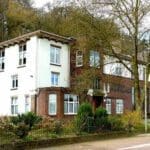
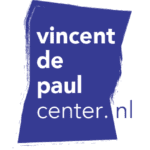
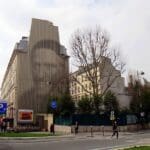
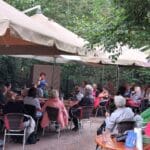

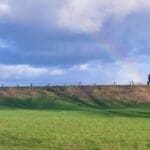




0 Comments